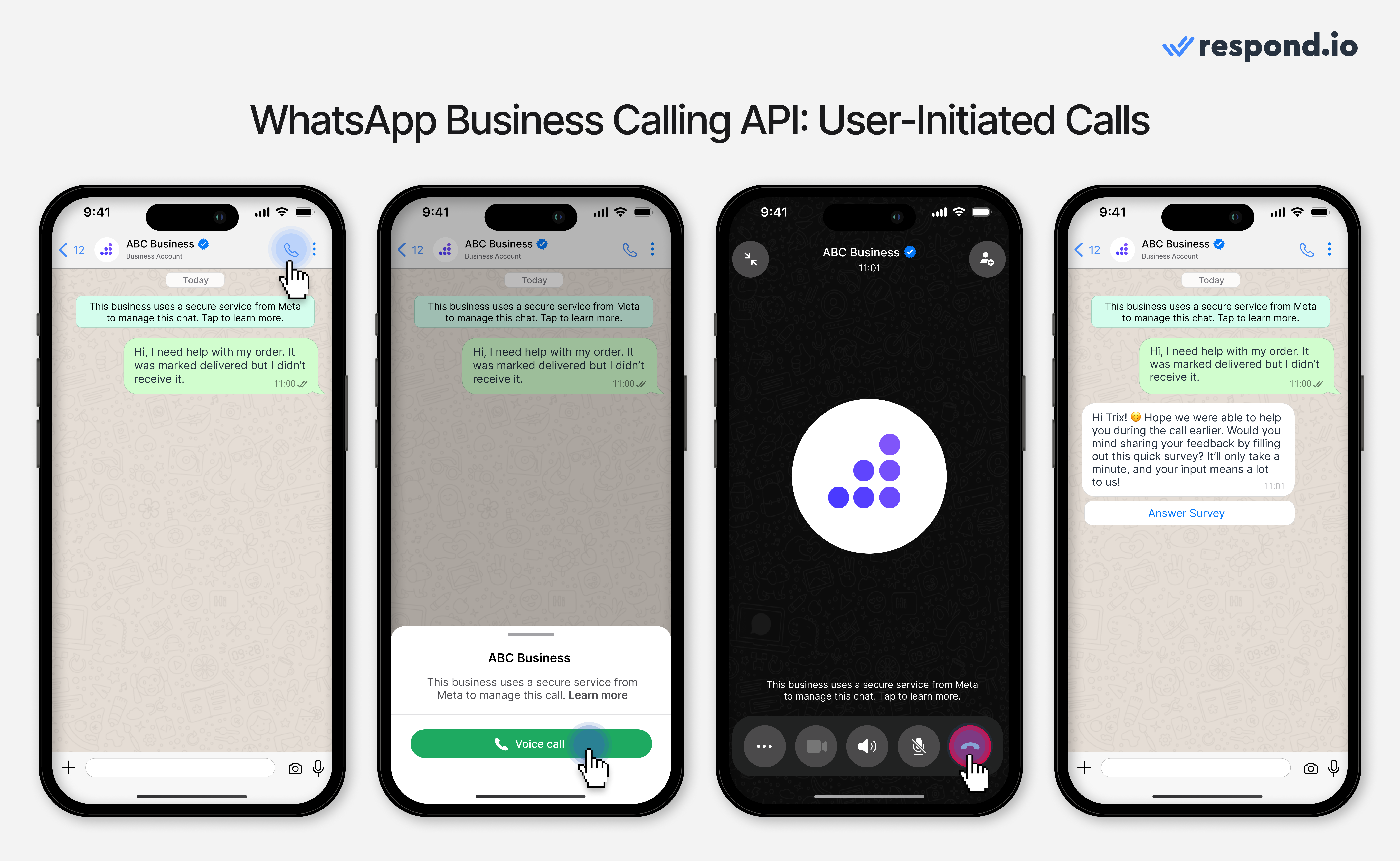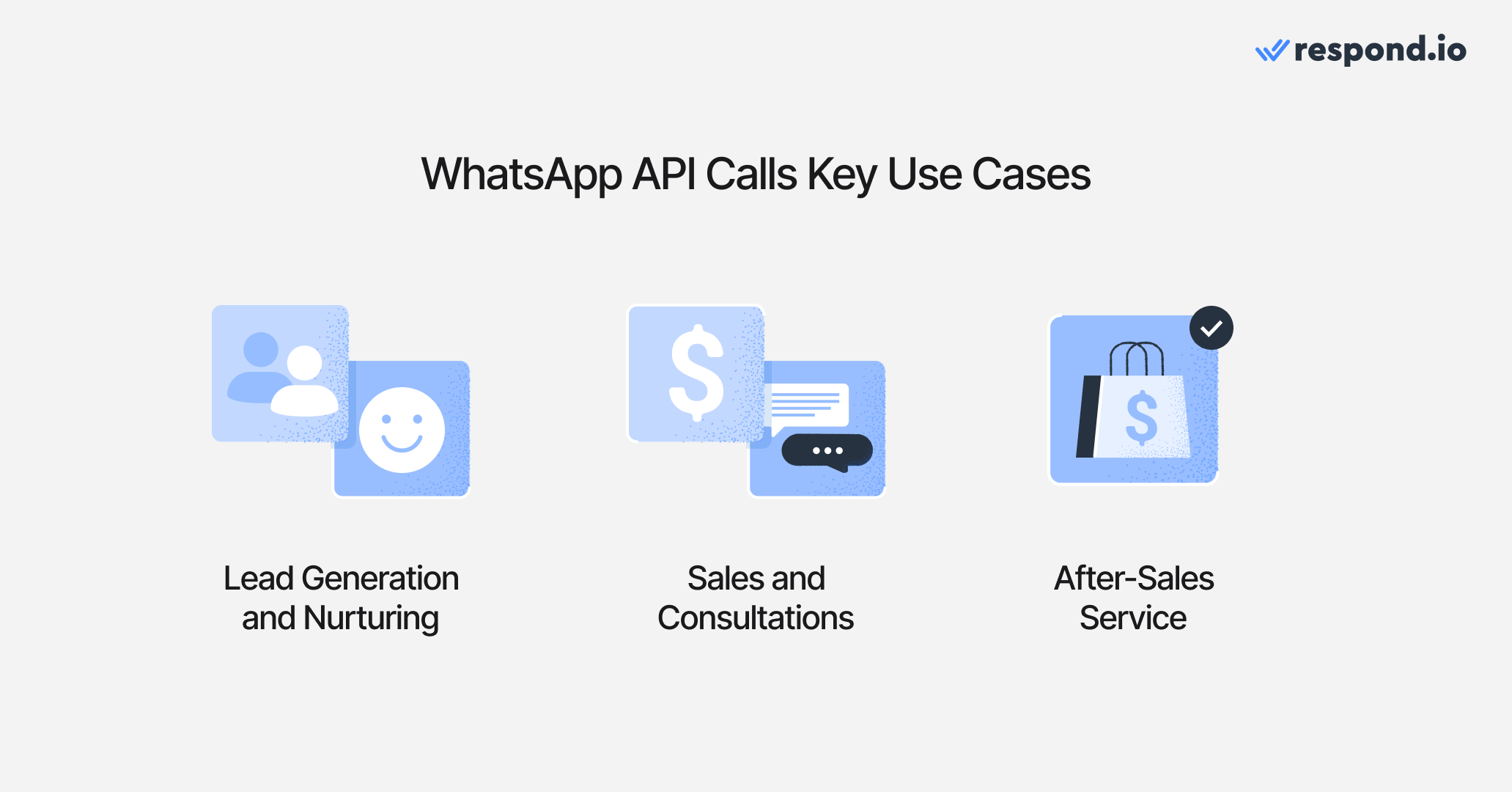
Upgrading from the WhatsApp Business App to the API gives businesses access to valuable features like advanced automation, expanded broadcast contact limit and more. However, one feature that has been on the business's wishlist is the ability to make calls through the API.
The good news? WhatsApp API calls are now available, meaning that you can upgrade from WhatsApp Business App to the API without losing voice calling. In this article, we’ll learn what WhatsApp Business Calling API is, how it works, its benefits and how you can get started.
What is a WhatsApp API Call?
WhatsApp Business Calling API or WhatsApp API calls give businesses the ability to make and receive voice calls with their customers, enhancing real-time communication via WhatsApp API.
WhatsApp Calling works directly inside WhatsApp where conversations already happen. There is no complex setup, no switching between tools, and no cost for inbound calls.
It’s not a full replacement for VoIP but for inbound, customer-initiated calls, it’s free and more immediate. Customers don’t need permission to call, and businesses don’t pay to pick up. For businesses using WhatsApp to sell and market, WhatsApp Business Calling is a smarter and more cost-effective version of VoIP, built into chat.
So, how do the calls actually work?
How Does WhatsApp Business Calling API Work
WhatsApp API calls prioritize customer privacy by ensuring that businesses cannot initiate calls without prior consent. It includes two types of calls, business-initiated and user-initiated, which we’ll elaborate on below.
Business-Initiated Calls

To initiate a call, businesses must send a permission request during an active Marketing, Utility, Authentication, Service or Free Entry Point conversation.
A business can send up to one permission request within 24 hours and two permission requests over seven days.
These limits reset once a call between the business and the customer is successfully connected.
After the contact grants permission, the business must make the call within 72 hours.
User-Initiated Calls

User-initiated calls are straightforward. Customers can start a call by clicking the call button in their WhatsApp app, through deep links embedded on business websites, apps or QR codes or via interactive messages with a click-to-call action. Businesses can choose to accept or decline these calls.
Now that you know how they work, let’s take a look at how they can benefit your business.
Turn conversations into customers with respond.io's official WhatsApp API ✨
Manage WhatsApp calls and chats in one place!
4 Benefits of WhatsApp API Calls
WhatsApp API calls have several benefits over texting messages and also VoIP. Let's cover some of them.
1. Built-in voice calling without the learning curve
Let customers call from WhatsApp—the app they already trust—while your team answers from respond.io. No extra tools, training or context switching needed. It’s just a natural extension of the conversation.
2. No-Cost Voice Calls (for Inbound from Customers)
Customer-initiated calls are 100% free for your business—no per-minute fees or call charges. Save budget while staying reachable to more customers.
3. The fastest way to talk to a business
Customers can call you with one tap, straight from the chat. No app switching, no copy-pasting numbers. Your team picks up the call in the same interface from which they message.
4. Global availability, instant access
Available wherever WhatsApp works—no setup delays or telco restrictions. Customers worldwide can reach you instantly, for free, making it perfect for global brands and distributed teams.
Key Use Cases for WhatsApp API Calls
WhatsApp API calls can be employed in various scenarios to enhance business operations and customer interactions. Below are some of the key ways businesses can use WhatsApp API calls effectively.

Lead Generation and Nurturing
WhatsApp API calls enable businesses to connect with potential customers when their interest is at its peak. When a prospect reaches out or shows curiosity about a product or service, a quick call can help businesses capture their attention, clarify questions and establish trust. This immediate engagement ensures leads don't lose interest or move on to competitors.
If a lead needs more time to decide, businesses can schedule follow-up calls to provide additional guidance, build trust and nurture the relationship through the sales funnel. As a result, businesses can enhance lead confidence and increase the likelihood of conversion.
Sales and Consultations
For businesses offering products or services that require personalized consultations, WhatsApp API calls enable seamless one-on-one engagement. Sales teams can provide tailored product recommendations, address specific customer needs and resolve objections in real time.
This immediacy accelerates the decision-making process, allowing leads to move confidently toward conversion. At the same time, businesses can foster trust and rapport, creating stronger relationships and driving higher success rates in closing deals.
After Sales Service
Enhancing customer loyalty goes beyond the point of sale. With WhatsApp API calls, businesses can offer seamless after-sales support, such as troubleshooting, maintenance scheduling or feedback collection. This level of service strengthens customer relationships and encourages repeat business and positive word-of-mouth referrals.
Getting Started with WhatsApp API Calls
Now that you have all the information you need, let's look at who can use WhatsApp API calls and how to get started.
Who Can Use WhatsApp API Calls?
If you're already using WhatsApp messaging with a verified sender or number, there's good news—voice calling is now available globally, giving your business even more ways to connect.
To leverage this feature effectively, businesses should have a clear inbound and outbound calling use case, such as:
Resolving customer service escalations
Conducting complex sales or marketing calls
Utility calls for last-mile communication, such as customers calling delivery drivers to confirm or adjust orders.
How to Get Started?
To get started, reach out to a WhatsApp Business Solution Provider (BSP) like respond.io. As one of the few providers offering the WhatsApp Calling API, respond.io has early access to the calling feature, giving you the opportunity to unify your calls and chats in one platform.
With respond.io, you don’t just enable WhatsApp calling — you upgrade your entire workflow:
AI Agents that handle inbound WhatsApp calls to greet, qualify customers and answer common questions.
AI-powered call summaries eliminate the need to replay recordings or read long transcripts.
Seamless call transfers on web and mobile let your team route live calls to the right agent.
Keep customers from repeating themselves and deliver smooth, efficient WhatsApp calls and messaging.
Turn conversations into customers with respond.io's official WhatsApp API ✨
Manage WhatsApp calls and chats in one place!
FAQ and Troubleshooting
Does WhatsApp Business Calling API support video calls?
Currently, video calls are not included as part of WhatsApp Business Calling API.
Do businesses need permission to call customers on WhatsApp?
Yes, businesses must obtain user permission before making a call. Permission can only be requested during an active Marketing, Utility, Authentication, Service or Free Entry Point conversation.
Can customers make international calls using the WhatsApp Business Calling API?
Yes, just as users can chat with international contacts, they can also make international calls using the API.
When will the WhatsApp Business Calling API be generally available?
As of July 15, 2025, WhatsApp Business Calling API is generally available to all WhatsApp API users unless they're in sanctioned countries or those with government restrictions on WhatsApp Calling (e.g., Saudi Arabia).
Do all WhatsApp Business Solution Providers (BSPs) support WhatsApp Calling?
No. Respond.io is among the first BSPs to support WhatsApp Business Calling API. As of now, platforms such as SleekFlow have not yet rolled out support for this feature.
Can I record and transcribe my teams’ or agents’ phone calls?
Use a VoIP or business phone system that includes call recording and transcription features for desktop and mobile apps. When implementing call recording, businesses should also consider local regulations, as laws governing mobile and business call recording vary by location and may require notifying participants or obtaining consent.
GDPR-compliant and ISO 27001 certified platforms like respond.io enable consistent and reliable recording of customer interactions across devices, maintaining high audio quality and easy access to recordings and transcripts.
Can I record calls in the EU?
In the European Union, call recording is regulated under GDPR, which requires all participants to provide explicit consent before any recording begins. This ensures that everyone involved is aware their conversation is being captured and agrees to it. The rule is similar to the two-party consent laws found in some US states. Businesses can simplify compliance by using GDPR-compliant platforms like respond.io, which allow you to automate requesting and recording contacts’ consent for personal data collection.
How can I manage calls and chats for multiple brands or locations independently within one system?
You don’t need multiple platforms to manage several users, teams or brands. Consolidate all your messaging and voice channels across brands and locations on respond.io, with separate workspaces for each. Segment agents by brand or team, while you route conversations to the right team, brand or location. Meanwhile account owners can still view overall agent and team performance such as response times, resolution times and more.
How long do you store chat and call history?
You have detailed call reports showing who made or received the call, duration and outcome on respond.io. These are stored indefinitely. You can access messages and call records from a year or more ago— nothing is automatically deleted.
How can you keep call records secure and compliant?
All call data on respond.io is stored using enterprise-grade security standards and protected with role-based access controls, ensuring only authorized users can access sensitive information. Call recording adheres to all applicable privacy and compliance regulations including GDPR requirements, and your full call history remains securely linked to each contact for as long as you use the platform.
Further Reading
If you found our article helpful, you should check out the following:






































 Electronics
Electronics Fashion & Apparel
Fashion & Apparel Furniture
Furniture Jewelry and Watches
Jewelry and Watches
 Afterschool Activities
Afterschool Activities Sport & Fitness
Sport & Fitness
 Beauty Center
Beauty Center Dental Clinic
Dental Clinic Medical Clinic
Medical Clinic
 Home Cleaning & Maid Services
Home Cleaning & Maid Services Photography & Videography
Photography & Videography
 Car Dealership
Car Dealership
 Travel Agency & Tour Operator
Travel Agency & Tour Operator




